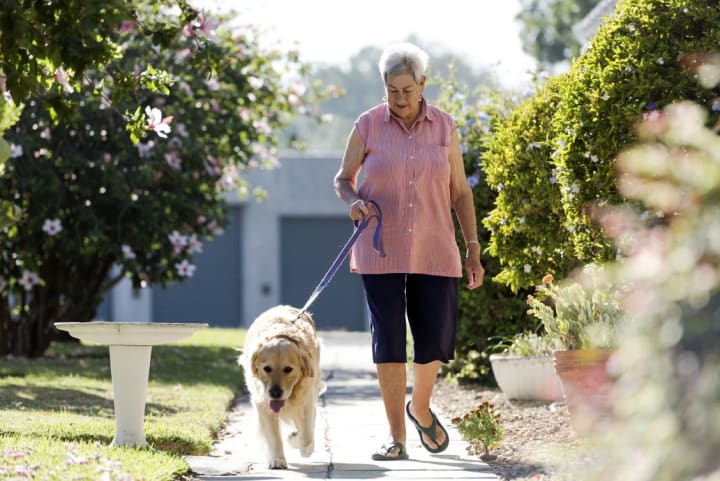Do you currently have a pet, or are you considering getting one? Animals can be a great addition to any lifestyle, even if (especially if) you live in a retirement community. There are a number of benefits from companionship to physical health to emotional well-being. All of which have been backed up by a number of medical journals and studies. So whether you already have a furry friend, or you're thinking about adopting one, these reasons we adore our pets will warm your heart.
Reasons to Why We Adore Pets
Cute Companions
Being an older pet owner can decrease stress, provide a sense of purpose, and draw more enjoyment and affection out of life, according to TIME. Animals also help establish a sense of routine. Dogs need to be let out daily. All animals need to be fed, bathed, and otherwise cared for on a routine basis. This is especially good for those with Autism Spectrum Disorder.
When thinking about getting a pet, you may want to give some thought to companionship. You might ask yourself questions like, Do I feel isolated or lonely? How might a pet change my daily life? Pets might be a little more high-maintenance than human companions, but the relationships built are worth the extra effort for those who can manage it.
Personal Workout Partners
Staying active can be difficult. That's why dogs (or any other pet that needs exercise) are great exercise buddies! And we don't mean puppies with dumbbells. If you own a dog, you're likely to have lower blood pressure and cholesterol levels, which reduce your risk of cardiovascular disease. Dog owners exercise more frequently and vigorously. They also require fewer doctor visits because of increased mobility according to this source. Plus, while you're out walking, you can meet other pet owners and make a new friend or two. Instead of lifting weights, you have the weight of staying active lifted off your shoulders.

In a Good Mood, Dude
You might already know this without the science, but having a pet can boost your mood. This article says that pets can increase both serotonin and dopamine levels, which reduce depression symptoms in older adults. Our animals make us feel so much more at ease, whether we're curling up on the couch to watch a long movie or sitting on the porch and listening to music. They make us smile when they comfort us and laugh when they do something silly. Cat videos are the internet's best friend for a reason. Pet therapy has been used to reduce stress and enhance social support in long-term care facilities, and this extends to retirement communities. There's no doubt about it — scientists say our non-human friends do wonders for our happiness.
A Better Quality of Life
Life is better with a furry companion. Research shows that aging adults can better manage daily difficulties if they have a pet nearby or at home. Pets reduce blood pressure, which means that in stressful situations, the body's natural response to stress (quick heartbeat, heavier breathing, tense muscles) is slower than an average person's. That's part of why animals lead to a reduction in heart problems. They also help with life transitions, offering consistency and friendship when a move or the loss of a loved one threatens to turn the world upside down. Even a few minutes of interacting with a pet can help bring the present moment into focus and calm us down.
Socialization Salvation
As we get older, it can be hard to spark conversations with possible new friends — whether it be our neighbors or someone in the community. Connecting with other animal lovers means we have a whole new avenue of conversation. People start social media pages for their pets because, well, pet owners like to talk to other pet owners! You can call and check up on your friend's pets or walk your dogs together. Talking about animals is almost always the perfect subject, and nobody loves to talk about their pets more than their owners.

Money Savers
As we said, owning a pet can mean you have fewer doctor visits and fewer medical bills to pay. That means you save money! Now, adopting an animal means visits to the vet for checkups and shots, and you'll have to pay for food and other necessities. But it's nice to know that as ownership costs go up, medical costs go down.
Part of the Family
There's nothing quite like the warm fuzzy feeling of your cat curling onto your lap and falling asleep, or your dog bringing you the mail, or your parakeet tweeting a good morning call. Animals quickly fall into our daily routines and live our lives with us. Pets establish themselves in our homes and our hearts, and they become family like that. From the moment we first meet them to when we establish strong bonds, animals are truly our best friends.
Having a pet may not be for everyone. Sometimes, those with lower mobility can have difficulty with the maintenance needed for pets, especially high-energy breeds. Finding a community that allows pets may also present some challenges, as well as stressors like finding pet sitters while traveling or during medical visits and stays. However, for those who still wish to connect with animals, there are special programs that connect seniors with pets. You can also volunteer at an animal shelter, which provides not only bonding time with pets, but an opportunity to do good for your community.
But living with pets in a retirement community is possible, and in fact, a great choice for many residents. Going to the dog park, attending animal-centered events, and socializing with other pet owners in the community are all benefits of being a pet owner in a senior housing facility. Pet ownership doesn't have to stop when moving to one of these communities; it can continue to help older adults thrive as they age. Having an animal can enhance senior living in so many ways. From teeny-tiny goldfish to giant fluffy dogs, being a pet owner is just paws-itively wonderful.


